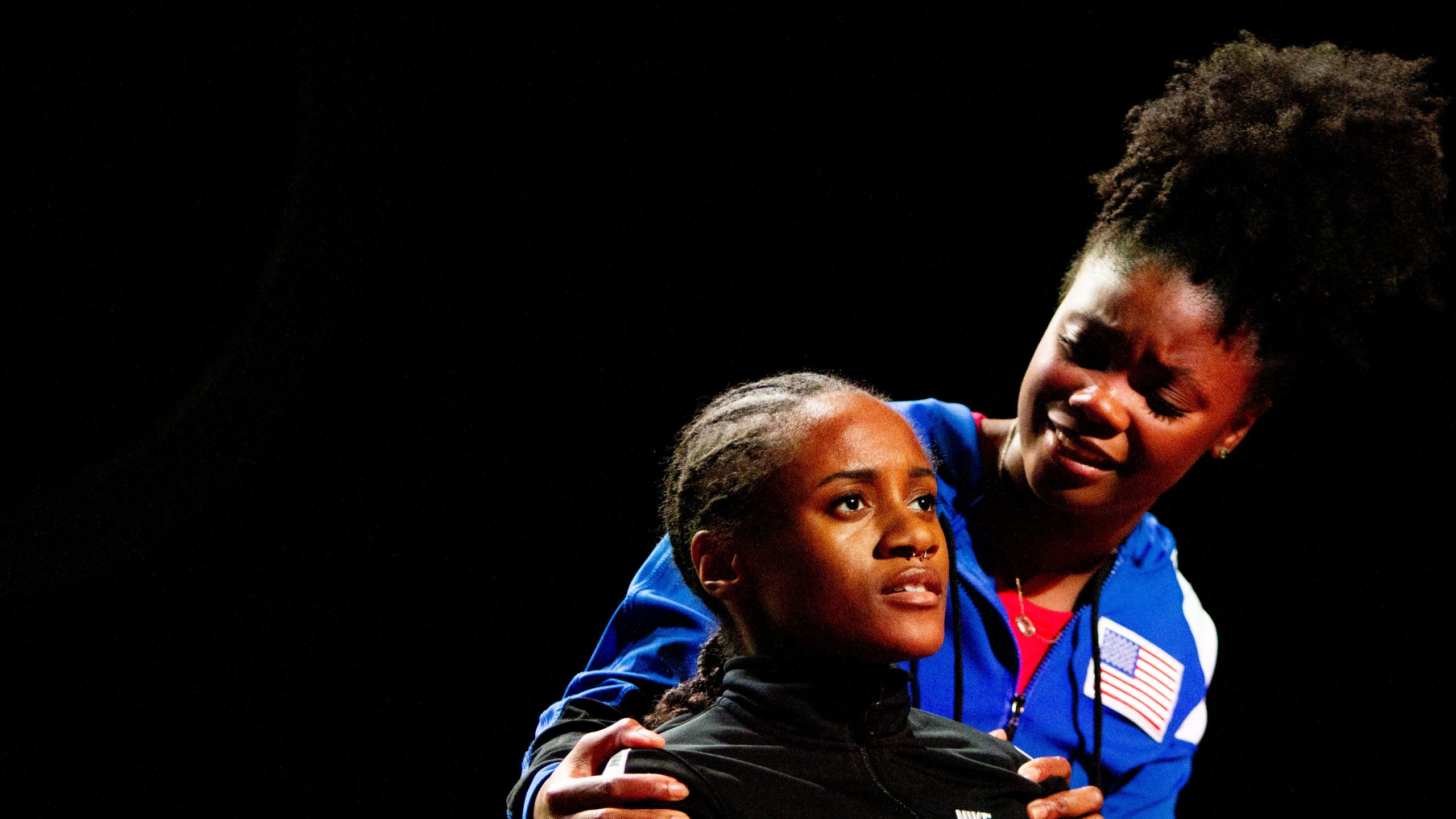
Shanthany Wilkerson and Monica Jones in ‘Jet Fuel’ at Bishop Arts Theatre Center. (Photo by Keith Vinson)
Inspired by the story of Olympic runner Caster Semenya, playwright Amy Evans takes a dive into the behind the scenes world of women athletes in Jet Fuel. The world premiere opened last weekend at Bishop Arts Theatre Center and concludes its run this Sunday. While the sport was front and center, the story was a deeper essay on a woman’s agency.
Directed by Tiana Kaye Blair, Jet Fuel focuses on American runner Mel Jackson, loosely based on Semenya, who is about to compete in the 2016 Rio Olympics alongside her teammates and close friend and roommate Grace Kennedy. But controversy surrounds Jackson as testing on the athlete finds an abnormal amount of testosterone. The truth of her intersex comes to distance Mel from the public eye and even her teammates.
RELATED: Playwright Amy Evans puts intersex and identity at the center of the new play Jet Fuel
In her portrayal of Jackson, Shanthany Wilkerson earnestly conveyed both strength and vulnerability. Her performance as a competitive athlete was believable, and she effectively showcased the character’s fear of being ostracized and outed. This fragility added a poignant depth to the character. In contrast, Monica Jones delivered a confident performance as Grace, providing a nice contrast to Wilkerson’s portrayal. Their chemistry as friends felt genuine, and as the story unfolded, their deeper connection became apparent.
Claire Fountain and Tayla Underwood played fellow teammates Courtney and Keisha respectively who both undergo their own obstacles. Fountain did triple duty with another character and the show’s intimacy captain. Keisha was the liveliest of the bunch and Underwood’s performance was charming with a magnetic smile. When both characters face their own challenges, the two actors were compelling in their more emotional moments.
As Russian competitor, and perhaps the bad guy of the show, Elena Petruschenkov, Alli Crabtree was serviceably unlikeable albeit through a smiling demeanor. The character manipulates her way out of trouble and navigates through the other runners’ own insecurities. Crabtree delivered on the goods but without her character ever being awful. Tanasha Friar’s performance first as the athlete’s tester Leslie and then as Jamaican runner Jo Mekki was solid all around. Friar had a quiet grace around her even as the more proud Mekki. As Swedish athlete Nora Kaas, Victoria England often felt restrained in her portrayal, but a strong performance still.
In a show centered on running, the portrayal of racing was ingeniously brought to life. Actors skillfully executed intricate step-dancing mirroring the movements of competitive runners. This clever depiction added an exhilarating burst of energy to the show, providing a refreshing contrast to the more dramatic moments. So much so, the audience often cheered on the racers.
Projection Coordinators Natalie Rose Mabry and Camron Ware created screen backdrops that depicted social media and race footage that worked successfully in punctuating the show with an added layer to an otherwise minimalist stage. With just a handful of interchangeable set pieces, benches really, Rodney Dobbs’ scenic work was smart and efficient and the looming Olympic rings were a powerful touch accented by Caroline Hodge’s and Claudia Martinez’s light and sound design. Suzi Cranford’s Olympic costumes also felt authentic, throwing back to just days when we were watching the Olympics on television.
Jet Fuel was a fascinating watch with a story that should open a conversation about many things. Evans’ story touched on women’s judgment in sports; it touched on intersexed identity and queer love; it touched on the Black experience all with a mindful perspective. If you find yourself asking a number of questions about the show, consider that a good thing.
The show runs through Sunday at BATC.
–Rich Lopez
